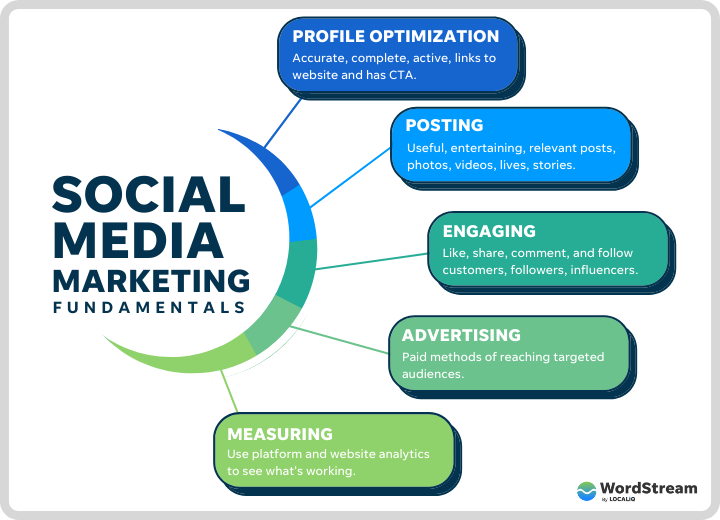
Social Media Marketing Specialist....
Social media marketing is a powerful way for businesses of all sizes to reach prospects and customers. People discover, learn about, follow, and shop from brands on social media, so if you’re not on platforms like Facebook, Instagram, and LinkedIn, you’re missing out! Great marketing on social media can bring remarkable success to your business, creating devoted brand advocates and even driving leads and sales.
In this complete guide to social media marketing, you’re going to learn:
- What social media marketing is, with benefits, stats, and tips.
- How to build a social media marketing strategy and a plan to carry it out.
- The seven best social media marketing platforms and how to use them
What is social media marketing?
Social media marketing is a form of digital marketing that leverages the power of popular social media networks to achieve your marketing and branding goals. But it’s not just about creating business accounts and posting when you feel like it. Social media marketing requires an evolving strategy with measurable goals and includes:
Social Media Marketing Specialist
- Maintaining and optimizing your profiles.
- Posting pictures, videos, stories, and live videos that represent your brand and attract a relevant audience.
- Responding to comments, shares, and likes and monitoring your reputation.
- Following and engaging with followers, customers, and influencers to build a community around your brand.
Social media marketing also includes paid social media advertising, where you can pay to have your business appear in front of large volumes of highly targeted users.
Benefits of social media marketing
With such widespread usage and versatility, social media is one of the most effective free channels for marketing your business today. Here are some of the specific benefits of social media marketing:
- Humanize your business: Social media enables you to turn your business into an active participant in your market. Your profile, posts, and interactions with users form an approachable persona that your audience can familiarize and connect with, and come to trust.
- Drive traffic: Between the link in your profile, blog post links in your posts, and your ads, social media is a top channel for increasing traffic to your website where you can convert visitors into customers. Plus, social signals are an indirect SEO factor.
- Generate leads and customers: You can also generate leads and conversions directly on these platforms, through features like Instagram/Facebook shops, direct messaging, call to action buttons on profiles, and appointment booking capabilities.
- Increase brand awareness: The visual nature of social media platforms allows you to build your visual identity across vast audiences and improve brand awareness. And better brand awareness means better results with all your other campaigns.
- Build relationships
Social Media Marketing Specialist
: These platforms open up both direct and indirect lines of communication with your followers through which you can network, gather feedback, hold discussions, and connect directly with individuals.
What Is a Social Media Marketer? And How to Become One
Working in social media marketing can be a lucrative career opportunity for trend-savvy professionals. Learn more.
Social media marketers are marketing specialists who use social media platforms to promote a company’s offerings. In addition to advertising, these marketers use platforms like Facebook, Instagram, Twitter, and TikTok to reach new customers, engage with current ones, and build a sense of connection and trust.
In this article, we’ll discuss how to get started in social media marketing. Afterward, if you’re ready to launch your social media career, consider enrolling in the Meta Social Media Marketing Professional Certificate, where you’ll learn how to craft effective social media posts and create a strong social media brand presence.

professional certificate
Meta Social Media Marketing
Launch your career as a Social Media Marketer. Build job-ready skills – and must-have AI skills – for an in-demand career. Earn a credential from Meta 5 months or less. No degree or prior experience required.
4.8
(18,857 ratings)
444,088 already enrolled
Beginner level
Average time: 5 month(s)
Learn at your own pace
Skills you’ll build:
Social Media Marketing, Generative AI in Social Media Marketing, Brand Management, Content Marketing, Digital Marketing, Performance Advertising, Social Media Marketing Strategy, Marketing, Campaign Management, Ad Management, Meta advertising, Meta Ads Manager, Marketing Content Development, content management, Content Development, Communication, Marketing Strategy, Ads Manager, Marketing Optimization, Digital Analytics
What is a social media marketer?
A social media marketer is a marketing professional who contributes anything from strategy to content to a company’s social media channels. The role will differ depending on company size. For instance, a smaller company may use a social media marketer to oversee more aspects of its social media marketing, while a larger company may have a bigger team dedicated to this work. In this case, a marketer plays a smaller part and focuses on one area, such as social listening or content creation.
Social media marketers need to be trend-savvy professionals who are comfortable analyzing data to understand the success of their social media efforts. They often also need to be strong writers and communicators and have some familiarity (or expertise) with social media production.
Social media manager vs. social media marketer: What’s the difference?
Social media managers and social media marketers have very similar roles, and the two titles can be used interchangeably. However, the term marketer is more commonly used for freelance specialists. While social media marketers can work in-house in a dedicated role within a company, many work as freelancers or contractors, completing social media marketing projects for their clients on a short or long-term basis.
Learn more: 14 Freelancer Jobs and How to Get Started

professional certificate
Meta Marketing Analytics
Launch Your Career in Marketing Analytics. Build job-ready skills – and must-have AI skills – for an in-demand career. Earn a credential from Meta in 7 months or less. No degree or prior experience required.
4.7
(2,364 ratings)
75,963 already enrolled
Beginner level
Average time: 7 month(s)
Learn at your own pace
Skills you’ll build:
Statistics for Marketing, Performance marketing, Data Analysis, Advertising Effectiveness Evaluation, Marketing Mix Optimization, Generative AI in Marketing Analytics, Marketing Plan, Linear Regression, Marketing, Marketing Mix Modeling, Python Programming, Pandas, Data Visualization, Spreadsheet, SQL, Tableau Software, Data Management, Marketing Science, Social Media Marketing, Ads Manager, Facebook Advertising, Statistical Analysis, Statistical Hypothesis Testing, Digital Marketing, Marketing Analytics, Meta advertising, A/B Testing
What do social media marketers do?
A social media marketer uses different social media platforms to promote a company’s offerings using text, graphics, and videos. Here are some tasks you might do as a social media marketer:
Oversee an organization’s overall social media strategy
Work with copywriters and designers to create and publish social media posts
Monitor social media analytics to optimize future performance
Stay up-to-date with social media trends, technologies, laws, and best practices
Respond to and engage with user comments and messages
Use social listening tools to understand what people are saying on social media about a company
Do social media marketers put out paid ads for companies?
Generally, the paid ads you might see on Facebook or Twitter are not orchestrated by social media marketers. Other marketing roles like advertising specialists, paid media specialists, and marketing coordinators typically oversee paid ad efforts. However, you may see smaller companies blend the usually distinct roles.

How much do social media marketers make?
Jobs in social media are projected to grow as social media usage for individuals and businesses continues to increase. According to Sprout Social, there are estimated to be 5.17 billion social media users in 2024 [1].
According to Glassdoor, social media marketers in the US make an average base salary of $64,134 [2]. The US Bureau of Labor Statistics (BLS) estimates jobs for advertising, promotions, and marketing managers will grow by 8 percent from 2022 to 2032, which is faster than average [3].
How to become a social media marketer
Follow the tips below to begin your career in social media marketing.
1. Learn social media marketing skills.
You’ll want to polish certain social media skills as you begin your job search. These include:
Social media knowledge: It’s crucial to know a variety of social media platforms well. The most commonly used platforms include Facebook, Twitter, and Instagram, but companies may also want WhatsApp, Pinterest, Tiktok, LinkedIn, and others, depending on their audience. You’ll want to know what kinds of posts do well on each platform, as well as the differences in audiences for each and how to capitalize on trends.
Analytical tools: Social media analytics tools are used to track performance, analyze trends, and mitigate digital risk. Commonly used tools include Hootsuite, SproutSocial, and HubSpot.
Content creation: Creating content for social media can look different depending on the platform, but you’ll generally need some design sensibility and a good grasp of writing skills.
Advance your social media analytics skills with the Johns Hopkins Social Media Analytics Specialization. Over four courses, you’ll learn how to conduct sentiment analysis to gauge public opinion on social media, informing brand positioning and messaging.

specialization
Social Media Analytics
Master Social Media Analytics for Key Insights. Gain expertise in analyzing social media data, employing machine learning techniques, and utilizing visualization tools for impactful insights.
238 already enrolled
Intermediate level
Average time: 3 month(s)
Learn at your own pace
Skills you’ll build:
Network Analysis, Social Media Analytics, Topic Modeling, Data Visualization, Natural Language Processing (NLP), Sentiment Analysis, Data Manipulation, Machine Learning, Text Processing, Machine Learning Classification, Sentiment Analysis Techniques, Building Semantic Networks, Social Theory Application, Network Construction, Data Analysis in R, Statistical Modeling, Centrality Analysis, Understanding Influence Dynamics, Critical Thinking in Digital Contexts, Social Network Analysis (SNA), Cognitive Bias Recognition, API Data Management, Information Design, Strategic Intervention Skills, Network Visualization Techniques, Relational Algebra Operations, Network Dynamics Understanding
2. Look for entry-level opportunities.
Entry-level opportunities can include marketing jobs, freelancing, or volunteering. Explore different options to see what fits your needs.
Entry-level jobs: An entry-level position generally requires less relevant experience and can provide you with the opportunity to learn about social media marketing on the job. In your job search, keep an eye out for entry-level titles such as:
Marketing intern or social media intern
Social media coordinator
Social media specialist
Social media associate
Social media analyst
Freelance: Consider freelancing to build up your experience. You can build a portfolio on a freelance website such as Fiverr or Upwork.
Volunteer: Volunteer opportunities may have less stringent requirements. Look for local or remote opportunities through volunteer search sites like VolunteerMatch.
Build your own social media pages: Sometimes jumping in and doing it yourself is the best way to learn. Create your own Instagram, TikTok, Twitter, or Facebook business page to learn the ropes of how each works and best practices in content creation. You can also point to these accounts in job applications as well.

professional certificate
Adobe Content Creator
Launch your career in content creation. Leverage AI and build the skills needed to go from newbie to pro while earning a credential that opens doors. No experience necessary.
4.6
(109 ratings)
10,963 already enrolled
Beginner level
Average time: 4 month(s)
Learn at your own pace
Skills you’ll build:
Content Strategy, Social Media, AI Responsibly, Generative AI, Visual Design, Content Production, Podcasting, Digital Media, Multimedia, Communication, Short-form video, Creativity, Graphic Design, Adobe Firefly, Visual Storytelling, Typography, Color Theory, Social Media Marketing, Social Content, Branding
3. Expand your professional network.
Networking can be a good way to learn more about job opportunities, get job-search advice, and gain knowledge about the field. Your network can include friends, family, alumni of your alma mater, or former coworkers.
If you don’t know where to start, join groups for social media professionals on LinkedIn or Facebook. This can expose you to different job postings, make you more familiar with the job landscape, and help you research how people landed the jobs they have. For more advice on networking, check out Coursera’s guide on networking.
Build social media marketing skills with Coursera
Learning the dynamics of social media is the first step in becoming a social media professional. If you’re looking for a place to start, consider the Meta Social Media Marketing Professional Certificate. After learning how to develop successful posts, you’ll then evaluate and interpret the results.
As an instance of technological convergence, various social media platforms adapted functionality beyond their original scope, increasingly overlapping with each other.
Examples are the social hub site Facebook launching an integrated video platform in May 2007,[43] and Instagram, whose original scope was low-resolution photo sharing, introducing the ability to share quarter-minute 640×640 pixel videos[44] (later extended to a minute with increased resolution). Instagram later implemented stories (short videos self-destructing after 24 hours), a concept popularized by Snapchat, as well as IGTV, for seekable videos.[45] Stories were then adopted by YouTube.[46]
X, whose original scope was text-based microblogging, later adopted photo sharing,[47] then video sharing,[48][49] then a media studio for business users, after YouTube’s Creator Studio.[50]
The discussion platform Reddit added an integrated image hoster replacing the external image sharing platform Imgur,[51] and then an internal video hosting service,[52] followed by image galleries (multiple images in a single post), known from Imgur.[53] Imgur implemented video sharing.[54][55]
YouTube rolled out a Community feature, for sharing text-only posts and polls.[56]
Usage statistics
[edit]
According to Statista, it is estimated that, in 2022, around 3.96 billion people were using social media globally. This number is up from 3.6 billion in 2020.[57]
The following is a list of the most popular social networking services based on the number of active users as of January 2024 per Statista.[58]
| # | Network | Number of users (millions) | Country of origin |
|---|---|---|---|
| 1 | 3,049 | United States | |
| 2 | YouTube | 2,491 | United States |
| 3 | 2,000 | United States | |
| 3 | 2,000 | United States | |
| 5 | TikTok | 1,526 | China |
| 6 | 1,336 | China | |
| 7 | Facebook Messenger | 979 | United States |
| 8 | Telegram | 800 | Russia |
| 9 | Douyin | 752 | China |
| 10 | Snapchat | 750 | United States |
| 11 | Kuaishou | 685 | China |
| 12 | 619 | United States |
Usage: before the pandemic
[edit]
A 2009 study suggested that individual differences may help explain who uses social media: extraversion and openness have a positive relationship with social media, while emotional stability has a negative sloping relationship with social media.[60] A 2015 study reported that people with a higher social comparison orientation appear to use social media more heavily than people with low social comparison orientation.[61]
Common Sense Media reported that children under age 13 in the United States use social networking services although many social media sites require users to be 13 or older.[62] In 2017, the firm conducted a survey of parents of children from birth to age 8 and reported that 4% of children at this age used social media sites such as Instagram, Snapchat, or (now-defunct) Musical.ly “often” or “sometimes”.[63] Their 2019 survey surveyed Americans ages 8–16 and reported that about 31% of children ages 8–12 use social media.[64] In that survey, teens aged 16–18 were asked when they started using social media. the median age was 14, although 28% said they started to use it before reaching 13.
Social Media Marketing Specialist
Usage: during the pandemic
[edit]
Usage by minors
[edit]
Social media played a role in communication during the COVID-19 pandemic.[65] In June 2020, a survey by Cartoon Network and the Cyberbullying Research Center surveyed Americans tweens (ages 9–12) and reported that the most popular application was YouTube (67%).[66] (as age increased, tweens were more likely to have used social media apps and games.) Similarly, Common Sense Media’s 2020 survey of Americans ages 13–18 reported that YouTube was the most popular (used by 86% of 13- to 18-year-olds).[67] As children aged, they increasingly utilized social media services and often used YouTube to consume content.

